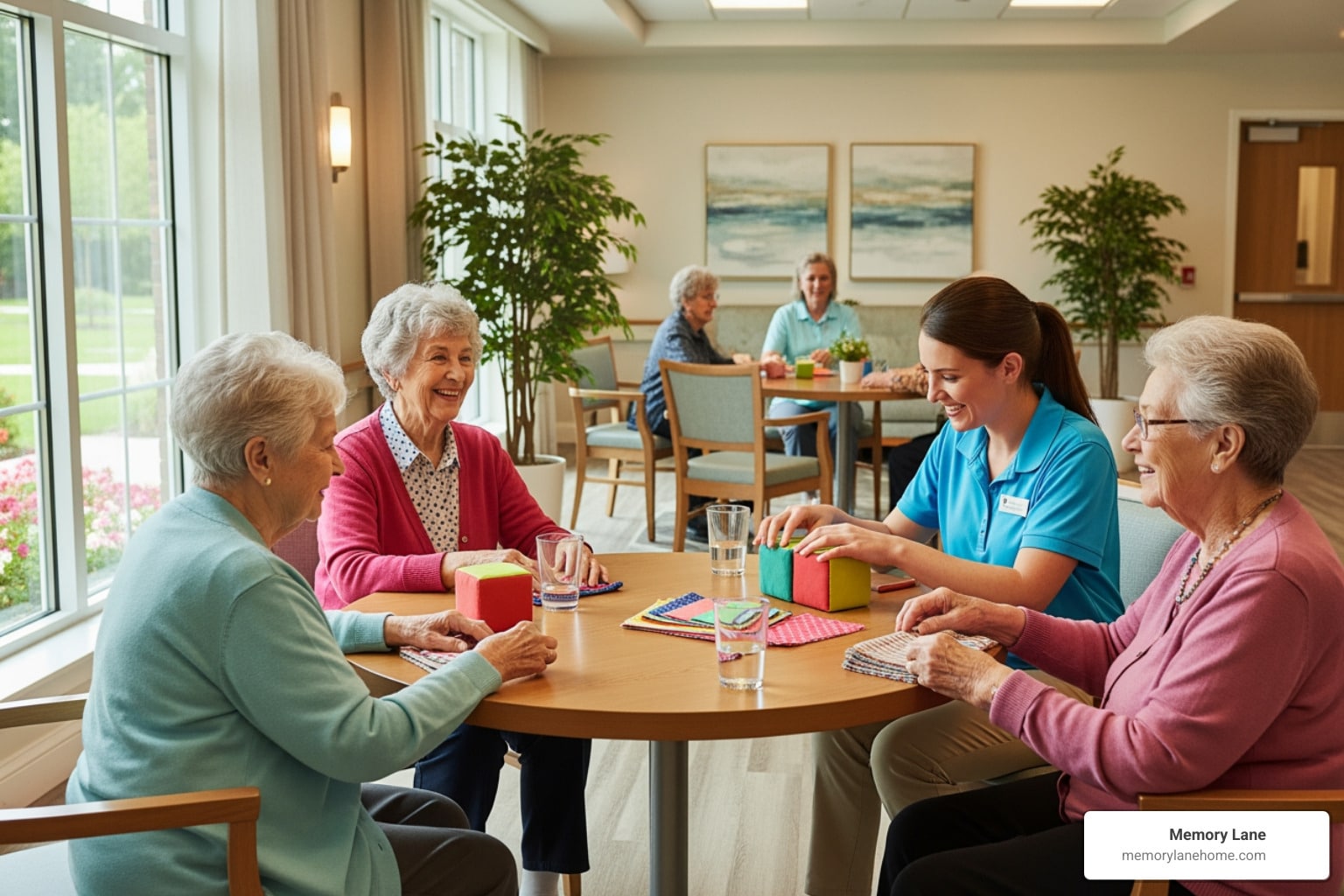Navigate memory care Howell. Discover top facilities, costs, and tips to select the perfect senior living for your loved one.

Find Local Support: Alzheimer’s Groups Near Me Explained
Find Local Support: Alzheimer’s Groups Near Me Explained

Alzheimer’s Support Groups vs Individual Counseling: Which Is Better for Dementia Caregiver Support?
Caregivers for loved ones with Alzheimer’s often face emotional exhaustion, isolation, and the burden of constant vigilance, and nearly 11 million Americans provide such care each year. Choosing between peer-led Alzheimer’s support groups and one-on-one individual counseling can transform a caregiver’s coping capacity, resilience, and overall well-being. This article explores what defines support groups and counseling, compares their mechanisms and benefits, and offers a structured decision framework. You will discover how Memory Lane Assisted Living’s home-like memory care complements external support, learn strategies to prevent burnout, and plan for long-term financial and residential considerations. Whether you search for “alzheimers support groups near me” or consider professional therapy, this guide maps the key differences, synergistic approaches, and actionable next steps to enhance caregiver mental health and sustain quality of life.
What Are Alzheimer’s Support Groups and How Do They Help Caregivers?
Alzheimer’s support groups are structured gatherings where caregivers share experiences, exchange practical tips, and receive emotional validation in a communal setting. These forums—available both in-person and online—provide a safe space for discussing behavioral challenges, navigating care transitions, and learning from peers who face similar daily stresses. By fostering mutual understanding, support groups promote stress reduction and a sense of belonging that counters isolation. Caregivers who engage regularly report improved coping skills, enhanced knowledge of care strategies, and reduced feelings of grief, and these benefits lay the groundwork for exploring more personalized interventions like counseling.
What Defines an Alzheimer’s Support Group?
- Community Chapter Meetings – Organized by nonprofit chapters with professional facilitators.
- Online Video Sessions – Virtual gatherings accessible from home, offering flexible scheduling.
- Peer-Led Circles – Informal, volunteer-moderated groups in libraries or senior centers.
- Themed Workshops – Focused sessions on topics such as legal planning or daily care techniques.
Each format provides a unique mix of education and emotional support, enabling caregivers to select the style that best fits their routine and learning preferences. This variety ensures that every caregiver can find a group aligned with their caregiving stage and personal comfort.
What Are the Key Benefits of Joining Support Groups for Dementia Caregivers?
- Emotional Validation – Sharing struggles with those who understand reduces stress and self-doubt.
- Practical Advice – Experienced members offer proven strategies for managing daily care challenges.
- Social Connectedness – Regular meetings combat isolation and foster lasting friendships.
- Resource Sharing – Participants exchange referrals for respite, legal guidance, and educational materials.
- Collective Resilience – Group solidarity strengthens resolve and sustains motivation through difficult stages.
These benefits build confidence and equip caregivers with a toolkit of tested methods for handling behavioral changes and legal or financial decisions, which naturally leads to considering more tailored support options.
What Are the Common Challenges or Drawbacks of Support Groups?
- Scheduling Conflicts – Fixed meeting times may clash with caregiving duties.
- Group Dynamics – Dominant individuals or emotional triggers can limit open sharing.
- Generalized Guidance – Advice may not address unique family dynamics or medical complexities.
- Transportation Barriers – In-person meetings require reliable travel arrangements.
Acknowledging these limitations helps caregivers weigh whether they need additional one-on-one professional support to address specific mental health needs, guiding the next section on individual counseling.
What Is Individual Counseling for Alzheimer’s Caregivers and What Are Its Benefits?
Individual counseling for Alzheimer’s caregivers consists of confidential, one-on-one sessions with a licensed therapist specializing in stress management, grief counseling, and caregiver coping strategies. Through evidence-based approaches—such as cognitive behavioral therapy and mindfulness training—counselors tailor interventions to each caregiver’s emotional profile, family situation, and stressors. This personalized attention accelerates emotional processing and equips caregivers with customized techniques to manage anxiety, depression, and role overload. Recognizing these advantages clarifies why some caregivers turn to counseling when peer support alone does not fully address their needs.
What Does Individual Counseling Involve for Dementia Caregivers?
- Assessment Phase – Therapist evaluates caregiver stress levels, coping style, and emotional health.
- Goal Setting – Collaborative establishment of realistic coping objectives and self-care routines.
- Skill Development – Practical training in stress reduction, communication techniques, and boundary-setting.
- Progress Review – Ongoing adjustment of strategies based on caregiver feedback and evolving challenges.
How Does Individual Counseling Support Caregiver Mental Health?
- Personalized Coping Strategies – Customized methods for managing intense emotions and daily stress.
- Emotional Processing – Safe space to explore grief, guilt, and frustration without judgment.
- Anxiety and Depression Management – Targeted interventions reduce clinical symptoms and improve mood.
- Resilience Building – Skills to navigate future care challenges with greater confidence.
What Are the Potential Limitations of Individual Counseling?
- Cost Considerations – Therapy fees may exceed caregiver budgets or insurance coverage.
- Therapist Availability – Specialists in dementia-related caregiver support may be limited in some areas.
- Time Commitment – Weekly sessions require consistent scheduling amid caregiving duties.
- Emotional Readiness – Some caregivers may hesitate to share intimate feelings with a stranger.
Understanding these barriers informs caregivers’ decisions about integrating therapy with peer support or respite care options.
How Do Alzheimer’s Support Groups and Individual Counseling Compare?
Support groups and individual counseling serve distinct yet complementary roles in caregiver support. Support groups leverage peer relationships to deliver communal empathy and practical tips, while individual counseling offers tailored therapeutic tools and deeper emotional processing. Deciding which is better depends on personal needs, stress severity, and logistics. Many caregivers find that combining both approaches yields the greatest relief, drawing on community solidarity and professional guidance in tandem.
What Are the Main Differences Between Support Groups and Individual Counseling?
- Support groups foster peer bonds and normalizing shared experiences.
- Counseling delivers professional insights and tailored coping plans.
- Group sessions may feel more affordable and socially engaging.
- Therapy sessions prioritize confidentiality and clinical techniques.
Which Factors Should Caregivers Consider When Choosing Support?
- Personal Preference – Comfort level with group sharing versus private therapy.
- Stress Intensity – Need for deep emotional work or practical peer tips.
- Financial Resources – Budget constraints and insurance coverage.
- Scheduling Flexibility – Availability of local meetings or therapist appointments.
- Desire for Community – Value of social connection versus one-on-one focus.
Can Support Groups and Individual Counseling Be Used Together?
Yes, combining support groups and counseling creates a holistic resilience strategy. Group meetings provide ongoing community encouragement and shared solutions, while therapy sessions deepen emotional insight and teach advanced coping mechanisms. This hybrid model maximizes benefit by addressing immediate social needs and long-term mental health, establishing a robust support network that adapts as dementia progresses.
How Does Memory Lane Assisted Living Support Caregivers Alongside These Support Options?
Memory Lane Assisted Living provides a home-like memory care environment with a high caregiver-to-resident ratio, ensuring seniors receive personalized attention that relieves families of constant oversight. This specialized care frees caregivers to attend support group meetings or counseling sessions, knowing their loved one is engaged in structured activities and compassionate monitoring. By blending professional residential care with external support networks, Memory Lane becomes a central partner in comprehensive caregiver well-being.
What Personalized Memory Care Services Does Memory Lane Provide?
- Home-like private suites with personalized decor and familiar routines.
- Structured cognitive activities led by trained staff to stimulate memory and engagement.
- Medication management and discreet monitoring to ensure safety and comfort.
- High caregiver-to-resident ratio enabling rapid response to behavioral changes.
How Does Memory Lane Offer Respite and Peace of Mind to Caregivers?
By providing scheduled respite stays and flexible short-term care, Memory Lane offers caregivers essential breaks for rest, support group participation, or counseling. Experienced staff handle daily routines—from meals to hygiene assistance—while families recharge emotionally and physically. This reassurance reduces caregiver guilt and fosters a sustainable care dynamic, allowing external support options to integrate smoothly into caregivers’ lives.
What Local Support Groups and Counseling Resources Are Available Near Ypsilanti and Ann Arbor?
- Washtenaw County Alzheimer’s Chapter Meetings, held monthly at community centers.
- Ann Arbor Virtual Caregiver Circles, offering weekly video support from licensed facilitators.
- Eastern Michigan University Counseling Services, providing affordable individual therapy sessions.
- Caregiver Outreach Support Groups, hosted by local faith-based organizations on alternating Tuesdays.
How Can Caregivers Prevent Burnout and Manage Emotional Stress?
Dementia caregiving often leads to chronic stress, fatigue, grief, and anxiety, which can escalate into burnout without proactive measures. Recognizing emotional challenges early and adopting structured coping methods preserves mental health and ensures sustained capacity to provide quality care. Integrating support groups, professional counseling, and self-care practices equips caregivers with a balanced toolkit for resilience.
Research indicates that caregiver burnout can lead to premature nursing home placement and increased health risks for the caregiver.
Preventing Caregiver Burnout in Dementia Care: Risk Factors and Management Strategies
Caring for patients with major neurocognitive disorders, other neuropsychiatric disorders, or functional impairments can lead to caregiver burnout, resulting in premature nursing home placement of the patient and increased risk for physical health problems and mortality in the caregiver. This chapter discusses risk factors and management strategies to help prevent early nursing home placement due to caregiver burnout, to prevent deterioration of caregiver health related to the burden of caregiving, and to reduce adverse health outcomes for patients. This chapter’s goal is to educate clinicians how to reduce risk of caregiver burnout and to preserve a rich and meaningful experience of a caregiver-patient relationship.
Caregiver burnout, 2017
What Are Common Emotional Challenges Faced by Dementia Caregivers?
- Chronic Grief – Mourning the progressive loss of their loved one’s abilities.
- Guilt and Self-Blame – Feeling inadequate when care tasks become overwhelming.
- Social Isolation – Withdrawal from friends and community due to caregiving demands.
- Anxiety and Depression – Persistent worry about the future and emotional exhaustion.
What Coping Strategies and Self-Care Practices Help Reduce Caregiver Burnout?
- Regular Breaks – Scheduling respite or short visits away from caregiving duties.
- Mindfulness and Relaxation – Daily meditation or breathing exercises to lower stress hormones.
- Physical Activity – Walking or gentle exercise routines to boost mood and energy.
- Structured Routines – Consistent sleep, meal, and leisure schedules to maintain stability.
How Do Support Groups and Counseling Address Caregiver Mental Health Needs?
Support groups and counseling complement each other by offering emotional validation and professional guidance. Group forums normalize experiences and supply community-driven solutions, while individual therapy delivers customized coping strategies for anxiety, depression, and grief. Combined, these resources build strength and resilience, empowering caregivers to navigate evolving care challenges with clarity and confidence.
Family-centered counseling approaches have been shown to be effective in addressing the complex challenges faced by dementia caregivers.
Family-Centered Counseling for Dementia Caregivers: Barriers, Facilitators, and Benefits
The aim of this study is to gain insight into the provision of the effective New York University Caregiver Intervention (NYUCI) in order to enhance its implementation.Methods:This is a qualitative study using a grounded theory approach. Group interviews were carried out with three purposefully sampled counselors who had provided the NYUCI.Results:Six themes were identified: (1) family problems, (2) ways to deal with these family problems, (3) barriers encountered by counselors,(4) ways to deal with these barriers, (5) facilitators or rewards of being a counselor, and (6) perceived effectiveness.The problem categories were (a) conflicts within families; (b) past experiences and personality; and (c) daily living with dementia. Ways of helping caregivers deal with these problems include
The process of family-centered counseling for caregivers of persons with dementia: barriers, facilitators and benefits, M Vernooij-Dassen, 2010
What Are the Long-Term Considerations for Dementia Caregiver Support?
Planning for the progression of Alzheimer’s involves anticipating changing care demands, legal responsibilities, and residential transitions to ensure continuous support. Early preparation of financial, legal, and living-arrangement plans reduces uncertainty and preserves both caregiver and patient quality of life. Understanding these long-term factors guides families toward sustainable support networks and care solutions.
How Should Caregivers Plan for Financial and Legal Aspects of Dementia Care?
- Establishing Power of Attorney and Health Care Directives through an elder law attorney.
- Evaluating long-term care insurance policies and Medicaid eligibility criteria.
- Assessing retirement and savings to cover care expenses.
- Consulting financial advisors specializing in senior care planning.
What Residential Care Options Complement Support Groups and Counseling?
- Memory Care Facilities – Secure units with dementia-focused programming and safety features.
- Assisted Living Communities – Offer personal care assistance alongside social activities and communal dining.
- Adult Day Programs – Provide daytime supervision and stimulation, allowing evening respite at home.
How Does Ongoing Support Impact Caregiver and Patient Quality of Life?
Sustained engagement with support groups, counseling, and professional residential care fosters enduring benefits: reduced caregiver stress, fewer depressive symptoms, and improved relationship quality. Patients experience stable routines, social interaction, and specialized memory activities, enhancing overall well-being. This integrated model of continuous support builds resilience for both caregivers and loved ones as Alzheimer’s progresses.
Caregivers who explore both group and individual support options find tailored relief and empowerment. Memory Lane Assisted Living’s personalized memory care services free families to engage fully in these resources and maintain a balanced, sustainable care approach. By blending peer empathy, professional therapy, and specialized residential care, families can prevent burnout, plan for the future, and preserve quality of life for everyone involved. To learn more about comprehensive memory care and caregiver support, visit memorylanehome.com or reach out to Memory Lane Assisted Living for guidance and personalized recommendations.
Frequently Asked Questions
What are the signs that a caregiver might need additional support?
Caregivers may need additional support if they experience persistent feelings of overwhelm, chronic fatigue, or emotional distress. Signs include increased irritability, withdrawal from social activities, difficulty concentrating, and neglecting personal health. If caregivers find themselves feeling hopeless or unable to cope with daily responsibilities, it’s crucial to seek help. Recognizing these signs early can prevent burnout and ensure caregivers maintain their well-being while providing care for their loved ones.
How can caregivers find the right support group for their needs?
Finding the right support group involves considering personal preferences, such as the group’s focus, format, and location. Caregivers should look for groups that align with their specific challenges, whether they prefer in-person meetings or online sessions. Researching local chapters, community centers, or online platforms can help identify suitable options. Additionally, attending a few sessions can help caregivers gauge the group dynamics and determine if it feels like a supportive environment for their needs.
What role does self-care play in a caregiver’s ability to provide support?
Self-care is essential for caregivers as it helps maintain their physical and emotional health, enabling them to provide better support to their loved ones. Engaging in self-care activities—such as exercise, hobbies, or relaxation techniques—can reduce stress and prevent burnout. When caregivers prioritize their well-being, they are more resilient and better equipped to handle the challenges of caregiving. This balance ultimately leads to improved care quality and a healthier relationship with the person they are supporting.
Are there specific resources for financial assistance for caregivers?
Yes, various resources can provide financial assistance to caregivers. Programs such as Medicaid, state-funded caregiver support programs, and non-profit organizations offer financial aid or subsidies for respite care, therapy, and other caregiving expenses. Additionally, some employers provide employee assistance programs (EAPs) that may include counseling services. Caregivers should explore local community resources and consult with financial advisors specializing in elder care to identify available options tailored to their needs.
How can caregivers effectively communicate with healthcare professionals about their loved one’s needs?
Effective communication with healthcare professionals involves being prepared and organized. Caregivers should keep a detailed record of their loved one’s medical history, current medications, and any behavioral changes. Preparing specific questions or concerns in advance can help ensure that all relevant topics are addressed during appointments. Additionally, being open and honest about the challenges faced can foster a collaborative relationship with healthcare providers, leading to better care strategies and support for both the caregiver and the patient.
What are some strategies for managing stress as a caregiver?
Managing stress as a caregiver can be achieved through various strategies. Regular breaks, whether through respite care or short outings, can help recharge emotional batteries. Practicing mindfulness techniques, such as meditation or deep breathing exercises, can reduce anxiety and promote relaxation. Establishing a support network of friends, family, or fellow caregivers can provide emotional validation and practical advice. Lastly, maintaining a structured routine can create a sense of stability, making it easier to manage daily caregiving tasks.
How can caregivers prepare for the long-term progression of Alzheimer’s in their loved ones?
Preparing for the long-term progression of Alzheimer’s involves proactive planning and education. Caregivers should familiarize themselves with the stages of the disease and anticipate changing care needs. Establishing legal and financial plans, such as power of attorney and healthcare directives, is crucial. Additionally, exploring residential care options and support services can help ensure a smooth transition as the disease progresses. Engaging in ongoing education about Alzheimer’s can empower caregivers to make informed decisions and provide the best possible care.
Conclusion
Caregivers who explore both group and individual support options find tailored relief and empowerment. Memory Lane Assisted Living’s personalized memory care services free families to engage fully in these resources and maintain a balanced, sustainable care approach. By blending peer empathy, professional therapy, and specialized residential care, families can prevent burnout, plan for the future, and preserve quality of life for everyone involved. To learn more about comprehensive memory care and caregiver support, visit memorylanehome.com or reach out to Memory Lane Assisted Living for guidance and personalized recommendations.


